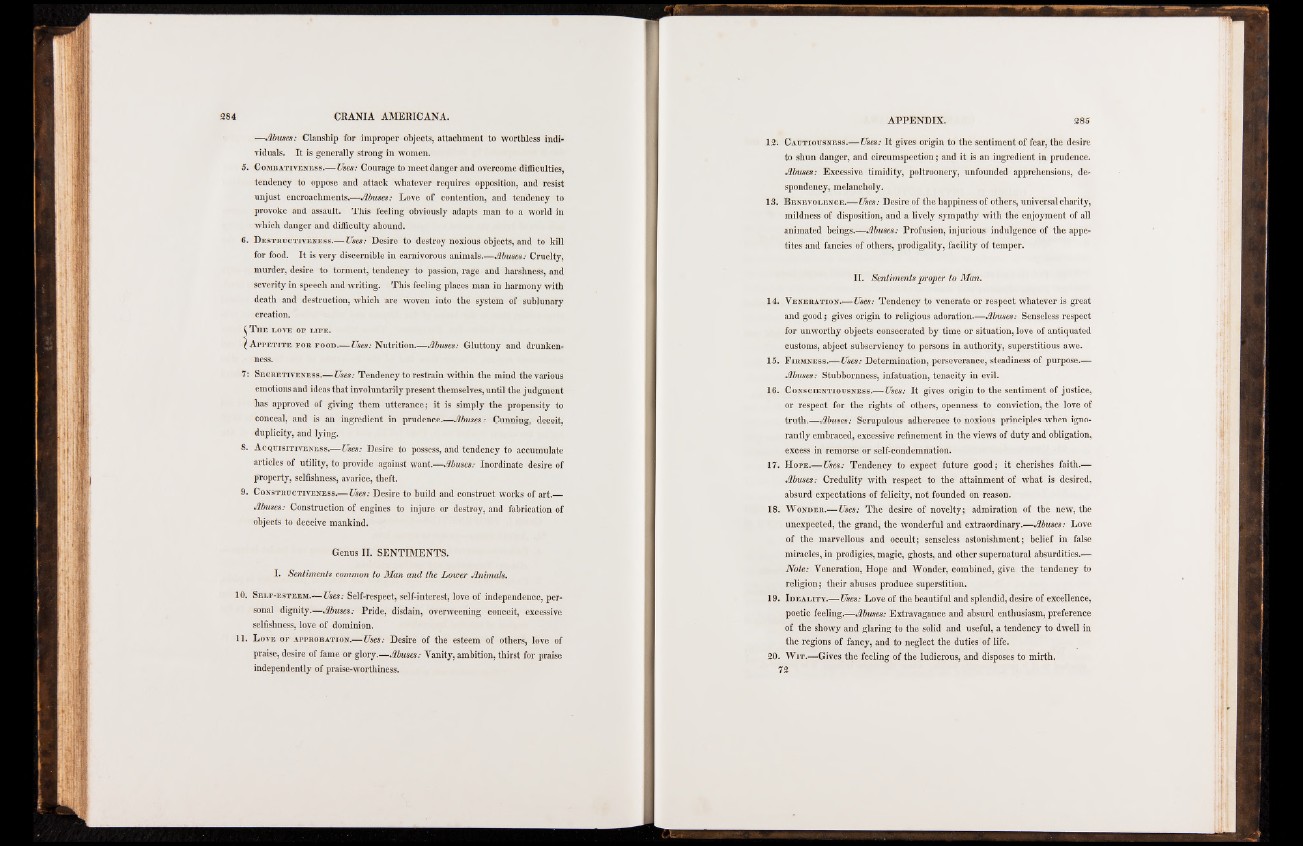
—Abuses: Clanship for improper objects, attachment to worthless individuals.
It is generally strong in women.
5. Combativeness.— Uses: Courage to meet danger and overcome difficulties,
tendency to oppose and attack whatever requires opposition, and resist
unjust encroachments.—Abuses: Love of contention, and tendency to
provoke and assault. This feeling obviously adapts man to a world in
which danger and difficulty abound.
6. Destructiveness.— Uses: Desire to destroy noxious objects, and to kill
for food. It is very discernible in carnivorous animals.—Abuses: Cruelty,
murder, desire to torment, tendency to passion, rage and harshness, and
severity in speech and writing. This feeling places man in harmony with
death and destruction, which are woven into the system of sublunary
creation.
(T he love of life.
(A ppetite for food.— Uses: Nutrition.—Abuses: Gluttony and drunkenness.
7: Secretiveness.— Uses: Tendency to restrain within the mind the various
emotions and ideas that involuntarily present themselves, until the judgment
has approved of giving them utterance; it is simply the propensity to
conceal, and is an ingredient in prudence.—Abuses: Cunning, deceit,
duplicity, and lying.
8. Acquisitiveness.— Uses: Desire to possess, and tendency to accumulate
articles of utility, to provide against want.—Abuses: Inordinate desire of
property, selfishness, avarice, theft.
9. Constructiveness.— Uses: Desire to build and construct works of art.—
Abuses: Construction of engines to injure or destroy, and fabrication of
objects to deceive mankind.
Genus II. SENTIMENTS.
I. Sentiments common to M a n a n d the Low er Animals.
10. Self-esteem.— Uses: Self-respect, self-interest, love of independence, personal
dignity.—Abuses: Pride, disdain, overweening conceit, excessive
selfishness, love of dominion.
11. L ove of approbation.— Uses: Desire of the esteem of others, love of
praise, desire of fame or glory.—Abuses: Vanity, ambition, thirst for praise
independently of praise-worthiness.
12. C autiousness.—Uses: It gives origin to the sentiment of fear, the desire
to shun danger, and circumspection; and it is an ingredient in prudence.
Abuses: Excessive timidity, poltroonery, unfounded apprehensions, despondency,
melancholy.
13. B en e v o le n c e .—Uses: Desire of the happiness of others, universal charity,
mildness of disposition, and a lively sympathy with the enjoyment of all
animated beings.—Abuses: Profusion, injurious indulgence of the appetites
and fancies of others, prodigality, facility of temper.
II. Sentiments proper to Man.
14. V en er a t io n .—Uses: Tendency to venerate or respect whatever is great
and good; gives origin to religious adoration.—Abuses: Senseless respect
for unworthy objects consecrated by time or situation, love of antiquated
customs, abject subserviency to persons in authority, superstitious awe.
15. F irmness.—Uses: Determination, perseverance, steadiness of purpose.—
Abuses: Stubbornness, infatuation, tenacity in evil.
16. C onscientiousness.—Uses: It gives origin to the sentiment of justice,
or respect for the rights of others, openness to conviction, the love of
truth.—Abuses: Scrupulous adherence to noxious principles when ignorantly
embraced, excessive refinement in the views of duty and obligation,
excess in remorse or self-condemnation.
17. H ope.—Uses: Tendency to expect future good; it cherishes faith.—
Abuses: Credulity with respect to the attainment of what is desired,
absurd expectations of felicity, not founded on reason.
18. W onder.— Uses: The desire of novelty; admiration of the new, the
unexpected, the grand, the wonderful and extraordinary.—Abuses: Love
of the marvellous and occult; senseless astonishment; belief in false
miracles, in prodigies, magic, ghosts, and other supernatural absurdities.—
No te : Veneration, Hope and Wonder, combined, give the tendency to
religion; their abuses produce superstition.
19. Id e a l i t y .—Uses: Love of the beautiful and splendid, desire of excellence,
poetic feeling.—Abuses: Extravagance and absurd enthusiasm, preference
of the showy and glaring to the solid and useful, a tendency to dwell in
the regions of fancy, and to neglect the duties of life.
20. W i t .—Gives the feeling of the ludicrous, and disposes to mirth.
72